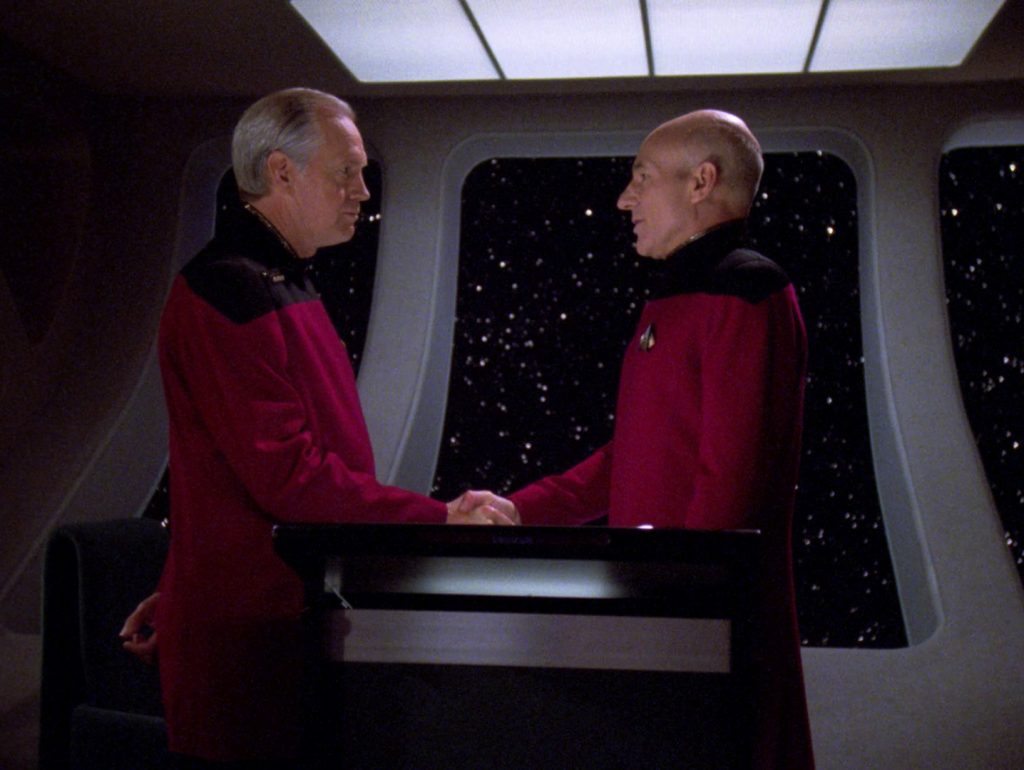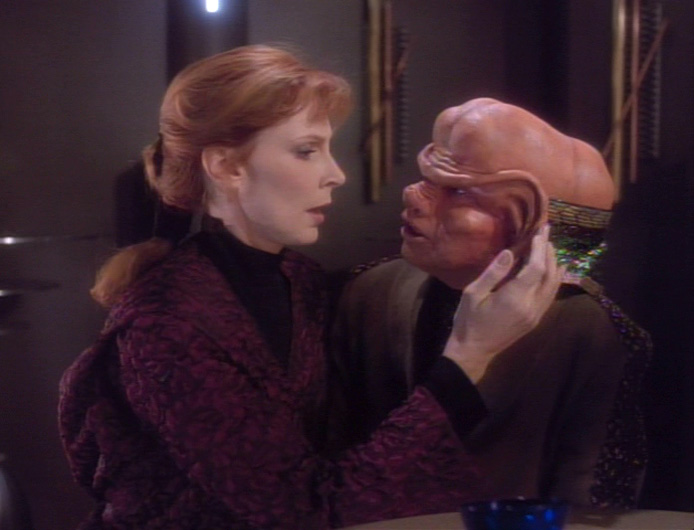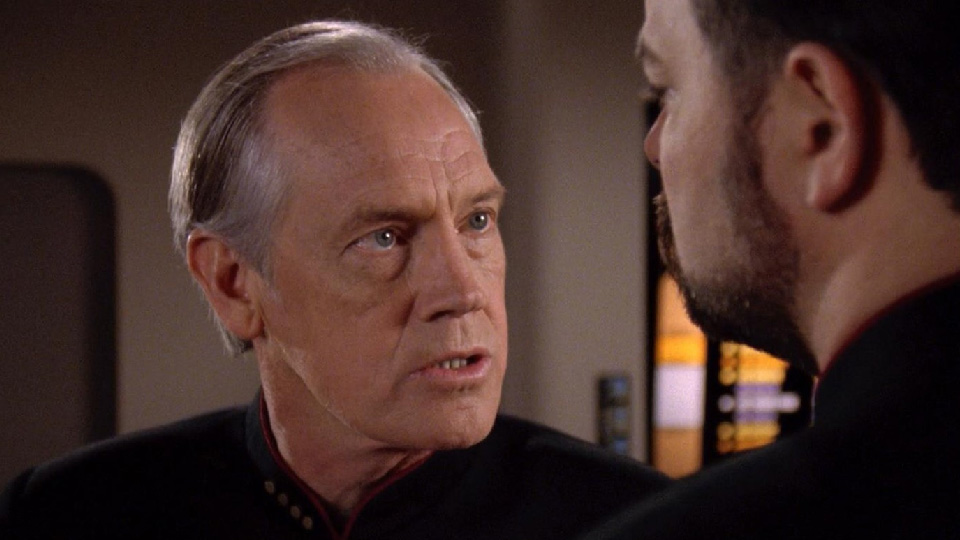‘Chain of Command’ is one of the best episodes of Star Trek: The Next Generation. The Season 6 two-parter is a classic, most remembered for the now meme-etic “There are four lights!” and the Orwellian attempt to break Picard. It’s a fantastic couple episodes of TNG.
But lost in the story of Picard’s capture and torture are some interesting thematic elements. What makes ‘Chain of Command’ so great is that the B-story is equally as fascinating to dissect. While I love Picard and his refusal to break as much as anyone, let’s take some time to examine everything else.
Enter Jellico

Edward Jellico, Captain of the U.S.S. Enterprise. Duh duh duhhhh! With Picard being sent on a top secret mission, Starfleet hands the Enterprise over to a controversial new captain. Jellico’s leadership style immediately clashes with the crew. He is a character easy to hate. Arguably, Jellico adds more tension to ‘Chain of Command’ than Gul Madred.
But Jellico is more than a mere plot device. He’s not some randomly corrupt Federation admiral. His character has depth and reason. Sure, he’s an asshole, but an asshole who kind of makes sense. You might not agree with the way he leads, but you can understand it.
‘Chain of Command’ portrays Jellico as the opposite of Picard, but are they really that different? Both are no-nonsense by-the-book captains. They are both willing to make tough choices despite personal feelings. Picard evolved into a softy over the seasons as the Enterprise crew grew together, but it isn’t that far fetched to see Picard as a Jellico-type figure in ‘Encounter at Farpoint’ or other early season adventures.
So why is Jellico so reviled? Clearly, the means in which he achieves his goals are very different from Picard’s. Take the negotiations with the Cardassians. Where Picard would use straight diplomacy, Jellico goes the Machiavellian route, posturing for strength and using force.
Or how about giving orders? Picard listens to and values input from his staff before making final decisions. This makes Riker a perfect First Officer for Picard. Jellico expects his staff to carry out his instructions without question. This is Jellico prefers Data as his First Officer.
Does this make Jellico a big ol jerk? Sometimes. Does it make Jellico wrong? I don’t think so.

‘Chain of Command’ places Jellico in a very precarious position. He must take over as Captain of the Federation’s flagship and negotiate his way out of a potential war with the Cardassians. If he fails, the cost could be astronomical.
Starfleet hand picked Jellico for this mission because of his leadership style and expertise. He isn’t there to make friends and make everyone feel all warm and fuzzy. He is there to stop a war.
When the crew criticizes Jellico for being brash and “taking the joy” out of serving, Jellico doesn’t see a problem. Those are not his skills and certainly not why Starfleet brought him into the mission. In some ways, Jellico even sympathizes with the crew on these issues, but points out that they don’t have that luxury.
While it is easy to dislike Jellico, it is difficult to argue he is bad at his job. There is a saying that goes something like: if you think everyone else is wrong, maybe you are the one in the wrong. But that doesn’t seem to be the case here. If anything, it is the crew of the Enterprise being unwilling to change after years of having the cushy life under Picard (which is an odd thing to say).
A Brief Interlude So I Can Man-Splain Feminism

Earlier I said that ‘Chain of Command’ is best remembered for “There are four lights!” What it is also known for, if not purely as a piece of obscure Trek trivia, is that Troi finally puts on a real uniform. Of course, this was at the request of Jellico.
Despite Star Trek’s reputation as paving the way for many controversial topics, it’s also very much a product of its time. For some reason (well, we know the reason) it took Troi six seasons before the writers found an excuse for her to stop wearing a revealing leotard.
Did we even need an excuse? Couldn’t Troi have just started wearing an official uniform one day? Apparently not. We had to get a hard-ass captain to come in and be the bad guy by ordering Troi to put some damn clothes on.
This is the same episode that required Dr. Crusher to use her feminine wiles to seduce a Ferengi into doing her bidding. Sure, she is the Chief Medical Officer of the Enterprise, but the writers can’t figure out a way to use her on a secret mission that isn’t slightly sexist.
While ‘Chain of Command’ may be remembered as the episode where it finally caught Troi up with the times, let’s not forget it was 1992. The woman had to be ordered to dress appropriately and the other woman had to use her body to complete a mission. Sigh.
Veni Vidi Vici
Despite the crew’s internal conflict, Jellico is ultimately successful in his mission. Not only does he successfully “negotiate” with the Cardassians and avoid direct conflict (with the help of some mines), he freaking saves Picard! Jellico is the hero of this story!
Obviously, I have my feelings on how the writers portray women in the episode, but I think they nailed Jellico. He’s the perfect love-to-hate character. He drives me crazy, but ultimately I understand why he acts the way he does. And it works!
And as suddenly as he arrived, in all of the pomp circumstance that comes with a change in command, Jellico just leaves. It’s a funny scene to rewatch, because as soon as Picard is back on the bridge he essentially just peaces out. It’s as if Jellico knows how unpopular he is, but doesn’t really care. He accomplished his mission and he’s on to the next.

I feel somewhat the same regarding Benjamin Maxwell. He is suppose to be a character that you are suppose to feel sorry for. But I don’t. I really liked him. They did all this storytelling in the episode to make him out to be a tragic figure only for Picard to admit he was right at the end. The only reason why Maxwell was considered “wrong” was that Starfleet wasn’t ready for another “sustained conflict”. And with that being the argument Starfleet threw out there, Maxwell’s actions may have helped prevent a war with the Cardassians. I already commented in your Trek CCG post. Maxwell was always my mission specialist in that game. He was a must have in my Fed deck. To this very day.
He was saying all the right things, he was just a jerk about it. The episode very well could have been a conflict free “Competent and easy-to-get-along-with Captain takes over the Enterprise for a special mission”. But I suppose that isn’t good TV…